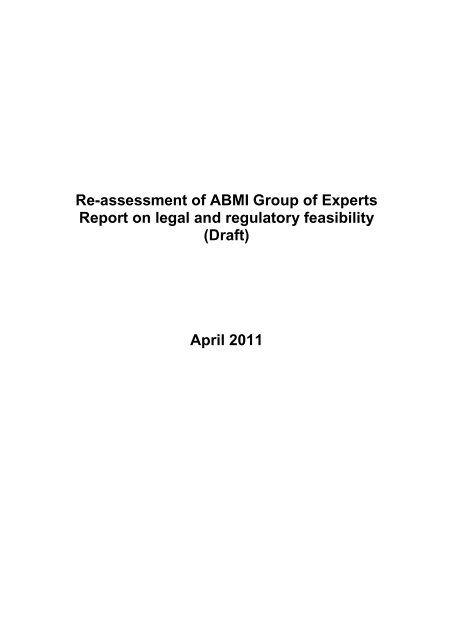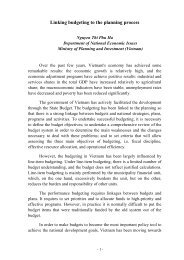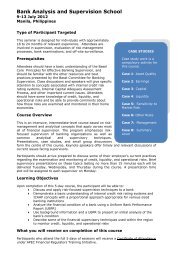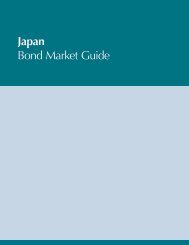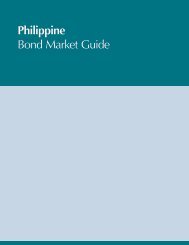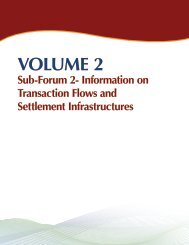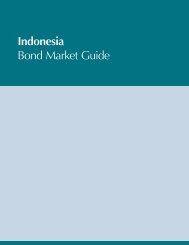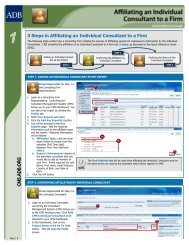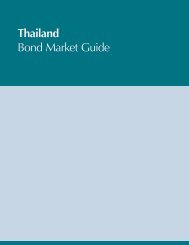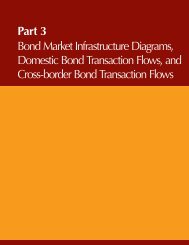ABMI Group of Experts Report - Personal File Sharing
ABMI Group of Experts Report - Personal File Sharing
ABMI Group of Experts Report - Personal File Sharing
Create successful ePaper yourself
Turn your PDF publications into a flip-book with our unique Google optimized e-Paper software.
Re-assessment <strong>of</strong> <strong>ABMI</strong> <strong>Group</strong> <strong>of</strong> <strong>Experts</strong><strong>Report</strong> on legal and regulatory feasibility(Draft)April 2011
Table <strong>of</strong> contents1. Overview <strong>of</strong> legal and regulatory information ..................................................... 21.1 General ....................................................................................................... 21.2 Asian ICSD Model ....................................................................................... 21.2.1 Settlement – Overview ......................................................................... 21.2.2 Barriers ................................................................................................ 3People’s Republic <strong>of</strong> China ............................................................................ 3Hong Kong, China ......................................................................................... 4Indonesia ....................................................................................................... 5Japan............................................................................................................. 6Republic <strong>of</strong> Korea .......................................................................................... 6Malaysia ........................................................................................................ 7Philippines ..................................................................................................... 7Singapore ...................................................................................................... 8Thailand ......................................................................................................... 8Viet Nam ........................................................................................................ 91.3 CSD Linkage Model .................................................................................... 91.3.1 Pre -requisites ...................................................................................... 91.3.2 Barriers .............................................................................................. 10People’s Republic <strong>of</strong> China .......................................................................... 10Hong Kong, China ....................................................................................... 10Indonesia ..................................................................................................... 10Japan........................................................................................................... 10Republic <strong>of</strong> Korea ........................................................................................ 11Malaysia ...................................................................................................... 11Philippines ................................................................................................... 11Singapore .................................................................................................... 11Thailand ....................................................................................................... 12Viet Nam ...................................................................................................... 122. Target information to be checked per market ................................................... 12People’s Republic <strong>of</strong> China .......................................................................... 13Hong Kong, China ....................................................................................... 13Indonesia ..................................................................................................... 13Japan........................................................................................................... 13Republic <strong>of</strong> Korea ........................................................................................ 14Malaysia ...................................................................................................... 14Philippines ................................................................................................... 14Singapore .................................................................................................... 14Thailand ....................................................................................................... 14Viet Nam ...................................................................................................... 151
1. Overview <strong>of</strong> legal and regulatory information1.1 GeneralThe purpose <strong>of</strong> this report is to provide a high level review <strong>of</strong> the legal and regulatoryissues associated with establishing an Asian ICSD or <strong>of</strong> establishing a CSD Linkagefor the ASEAN+3 markets. This report focuses on potential impediments or aspects<strong>of</strong> market mechanics that might either prevent an ICSD from providing its full range <strong>of</strong>services or make the possibility <strong>of</strong> a CSD Linkage feasible. It highlights legal barriersthat have already been identified in the <strong>Group</strong> <strong>of</strong> <strong>Experts</strong> RSI report (the “originalreport”) issued in April 2010 and indicates changes or evolutions <strong>of</strong> regulations orlaws noticed on each market.This document is intended to:provide an overview <strong>of</strong> the legal and regulatory changes noticed in theASEAN+3 markets and already identified in the legal feasibility study <strong>of</strong> theGoE RSI report for each market.where possible, highlight the evolution <strong>of</strong> laws and regulations per marketduring the year 2010 since the compilation <strong>of</strong> the GoE RSI report.support interpretation <strong>of</strong> the target information table.This document does not represent a legal opinion regarding any <strong>of</strong> the laws orregulations cited herein or that have been referred to implicitly.This document does not make any assumptions regarding the nature <strong>of</strong> the solution(either Asian ICSD or linkage <strong>of</strong> existing CSDs) that is envisaged. Neither does thisdocument seek to anticipate the specific requirements that the implementation <strong>of</strong>either one <strong>of</strong> these solutions might demand.For your reference, please refer to the barriers list table in excel file for each marketas attachment 1.1.2 Asian ICSD Model1.2.1 Settlement – OverviewIn the original Legal Feasibility Study, it appears that in respect <strong>of</strong> establishing asettlement link with a specific market, and to permit an Asian ICSD to provide its corefunction there are 2 requirements: (1) acceptance <strong>of</strong> omnibus accounts, which wouldenable the Asian ICSD to provide its full range <strong>of</strong> services such as internalsettlement; and (2) acceptance or recognition <strong>of</strong> an intermediated or multi-tieredholding structure – which recognises the concept <strong>of</strong> nominee ownership - where thebeneficial owner (the ultimate end investor) does not need to be specificallyidentified. This is because the ICSD does not act for its own account. Whereintermediated holding are recognized, it ensures that the beneficial owners receivethe full set <strong>of</strong> rights <strong>of</strong> any investor.2
1.2.2 BarriersPeople’s Republic <strong>of</strong> ChinaNeither <strong>of</strong> the ICSDs currently <strong>of</strong>fer their customers access to the Chinese “A ShareMarket”. The “A Share” market is a major market for RMB-denominated securitiesissued by domestic issuers. A “B Share Market” exists to allow local issuers to emitdomestic securities denominated in US dollars (USD) or Hong Kong dollars (HKD).In the original report it was highlighted that securities accounts must be segregated inname <strong>of</strong> beneficial owner 1 - marked as barrier A1 (Market A, barrier number 1 in thebarriers list table). Barrier A1 would prevent an Asian ICSD from providing internalsettlement services and a broader range <strong>of</strong> services such as Collateral Managementor Securities Lending facilities which are integral to the role <strong>of</strong> an ICSD as an“aggregator”. Article 139 and Article 166 <strong>of</strong> the Securities Law <strong>of</strong> the People’sRepublic <strong>of</strong> China dated 29 th April 2009 indicate upon the client’s application, asecurities depository and clearing institution shall open a securities account and asecurities company shall open a funds account for the client in accordance withrelevant provisions. There are no new announcements or decrees published thatwould update this rule. Further investigation would be needed in order to checkwhether omnibus accounts will be permitted in the near future. However, TheChinese Government is working towards relaxing certain, specific regulations thataffect the bond market. In December 2008, Chinese regulators announced thatforeign banks could begin underwriting and trading corporate bonds.With regards to Articles 48 and Article 50 <strong>of</strong> Securities Depository and Clearing Rulesdated 28 th November 2008, as set out by the China Securities RegulatoryCommission (CSRC) and the circulars <strong>of</strong> the People’s Bank <strong>of</strong> China (PBOC), thetransfer <strong>of</strong> securities ownership between a clearing participant and its client shall beexecuted by the CSDCC. The PBoC announced in August 2010 that <strong>of</strong>fshore banksengaging in RMB trade settlement, Hong Kong and Macau clearing banks andoverseas central banks can open securities accounts with the depository andclearing institutions for the Chinese inter-bank bond market. Based on feedback fromlocal authorities, with regard to the Asian ICSD, there is no specific policy on whetherit would be able to become a direct account holder in either the CSDCC or CDC.Access by non-residents to the “A Share Market” remains restricted to entities thatapply for and fulfil the requirements to act as Qualified Foreign Institutional Investors(QFIIs). This barrier is highlighted as barrier A3. QFIIs are allowed to invest in RMBdenominatedfinancial products approved by CSRC within their respective investmentquota. In addition, <strong>of</strong>fshore banks engaging in RMB trade settlement, Hong Kong andMacau clearing banks and overseas central banks can invest into domestic interbankbond market. As indicated in the RSI Feasibility Study, there are aspects <strong>of</strong> theQFII mechanism that restrict the efficient operation <strong>of</strong> the activities <strong>of</strong> an ICSDorganisation.Marked as barrier A4 in the table, it is mentioned in the original report thatconvertibility conditions <strong>of</strong> the RMB and restrictions on remittances will prevent theAsian ICSD from establishing a cash link with People’s Republic <strong>of</strong> China. TheChinese government has recently given indications that the timeframe for RMBconvertibility could be accelerated; the clearest indication <strong>of</strong> this has been1 Market Comparison Matrices (for bond) GoE Subcommittee B ( link available in the matrix)3
demonstrated in the development <strong>of</strong> the <strong>of</strong>fshore RMB market via Hong Kong, Chinain order to facilitate the use <strong>of</strong> the RMB as a settlement currency for trade and othercurrent account transactions.It can be supposed that the RMB will ultimately acquire an international status trulyreflective <strong>of</strong> its economic weight and trade scale. In April 2009, the Chinesegovernment announced a pilot scheme that permits cross-border trade - in Renminbi(RMB) – between selected business zones on the Mainland (Shanghai, Shenzhen,Guangzhou, Zhuhai and Dongguan) and Hong Kong, China. This scheme hassubsequently been extended to cover trade and current account transactionsbetween a total <strong>of</strong> 20 Chinese provinces and overseas markets, which collectivelyaccount for 95% <strong>of</strong> Chinese external trade.On July 19, 2010, The People’s Bank <strong>of</strong> China (PBOC), the Chinese central bank,and Hong Kong’s RMB clearing bank, Bank <strong>of</strong> China (Hong Kong) Limited (BOCHK),signed a revised Settlement Agreement on the Clearing <strong>of</strong> Renminbi Businesses inHong Kong, China. Although this development allows the two existing ICSDs to beable to hold RMB cash balances in order to facilitate the settlement and custody <strong>of</strong>RMB-denominated instruments in Hong Kong, China, restrictions on the flow <strong>of</strong>“<strong>of</strong>fshore RMB” into Mainland China remain in place. The <strong>of</strong>fshore RMB markets hasdeveloped and the total volume <strong>of</strong> RMB deposits in Hong Kong, China rose toRMB279.6bn (US$42bn) by the end <strong>of</strong> November 2010, an increase <strong>of</strong> 29% on thecorresponding figure for October 2010 and a 363% increase year-on-year.In August 2010, the PBoC announced that <strong>of</strong>fshore RMB liquidity could be reinvestedinto the Chinese domestic (interbank) bond market. Following this announcement,<strong>of</strong>fshore banks engaging in RMB trade settlement, Hong Kong and Macau clearingbanks and overseas central banks 2 can invest in the Chinese interbank bond market;in addition, purchase activity is subject to quotas. This development provides amechanism for financial institutions to move <strong>of</strong>fshore RMB funds back to themainlandHong Kong, ChinaNo legal/regulatory issues were identified in the original report. Both European ICSDshave full links with the Central Moneymarkets Unit (CMU) operated by the HongKong Monetary Authority (HKMA). Omnibus accounts continue to be supported andthe nominee concept is accepted. Neither the HKMA nor the Securities and FuturesCommission (SFC) has published any circulars or new regulations during year 2010and the first quarter <strong>of</strong> 2011 that would constitute a legal barrier from establishing adirect settlement link with the domestic CSD(s) in Hong Kong, China.Following the expansion <strong>of</strong> the RMB trade settlement scheme in June 2010, theHKMA and the People’s Bank <strong>of</strong> China (PBOC) signed a SupplementaryMemorandum <strong>of</strong> Co-operation in July 2010 to strengthen co-operation and furtherpromote the wider use <strong>of</strong> RMB outside Mainland China. At the same time, the PBOCand Bank <strong>of</strong> China (Hong Kong) Limited (BOCHK), the RMB Clearing Bank, signed arevised Settlement Agreement on the Clearing <strong>of</strong> RMB Businesses in Hong Kong,China. The revision <strong>of</strong> the Settlement Agreement effectively permits all corporates toopen RMB bank accounts in Hong Kong, China and removes the restrictions on RMBconversion and interbank transfers between personal accounts and corporateaccounts, while restrictions on individuals’ RMB conversion and cross-border2 Currently this includes the central banks <strong>of</strong> Argentina, Belarus, Iceland, Indonesia, Malaysia, Singapore, South Korea andHong Kong, China.4
transfers <strong>of</strong> RMB funds into Mainland China still apply 3 . Under the new arrangement,ICSDs can open RMB accounts in Hong Kong, China and provide clearing andsettlement services through their platforms.IndonesiaAs a clarification to the original report that states that “Clearstream Banking hasrecently opened a link”, it should be noted that Clearstream’s link for Indonesianequities and corporate bonds has been in place since 1996. Clearstream does notcurrently have published solution for government debt instruments.The original report states that from 01 September 2006, all corporate bonds andgovernment bonds transactions must be reported to the Indonesian capital marketregulator, BAPEPAM, through the stock exchange within 30 minutes <strong>of</strong> theirexecution. <strong>Report</strong>ing <strong>of</strong> OTC/<strong>of</strong>f-exchange transactions must also be made bymarket participants or by an appointed market participant in the event that the partiesto the transaction are not market participants. This regulation is maintained andgoverned by the rule X.M.3 which explains all bond transaction reportingrequirements. The failure to submit necessary reports is subject to penaltiesimposed by BAPEPAM and are applied from the first hour following which the reportis delayed. The market practice for local custodians in Indonesia in order to facilitatethese reporting requirements is to maintain segregated (sub-) accounts in the name<strong>of</strong> the investor (and which are covered for tax purposes by an appropriate DGT formcompleted in the name <strong>of</strong> the investor).In October 2010, it was also announced by the KSEI that the Indonesian CentralSecurities Depository (PT Kustodian Sentral Efek Indonesia - KSEI) would introducea unique identifier code, known as the Single Investor ID (SID), for investors whotrade in securities via local brokers on the Indonesian Stock Exchange (IDX) andwho, as a consequence, maintain an account in their name at the KSEI. The SID willbe allocated to investors’ securities accounts at the KSEI; each KSEI account cansupport only one SID. The SID will be issued at registered account holder level andit is understood that from 1 April 2011 it will be mandatory to quote the SID as areference for all exchange-based trades. Investors operating through multiple brokerswill be required to maintain a single SID, which will be assigned to the multipleaccounts that the investor has at the KSEI through its multiple brokeragerelationships. At this stage, the SID is not required for settlement or custodypurposes; however, this requires further monitoring as it could impact theresponsibilities <strong>of</strong> an Asian ICSD.With regards to barrier marked C2 in the barriers list table as Attachment 1, thepurchase <strong>of</strong> foreign currency against IDR below USD 100,000, or equivalent, permonth must be supported by a written statement confirming that the purchase <strong>of</strong>foreign currency does not exceed USD 100,000 per month. This regulation remainsthe same as indicated in the original report and is still governed by Bank IndonesiaLaw No.10/28/PBI/2008 and Circular Letter No.10/42/DPD.In addition to the documentary requirements for entities entering into foreign currencytransactions, it should be noted that non-resident cash account holders that makecash payments are required to provide “purpose codes” outlining the reason for thetransaction (i.e. evidencing the underlying investment activity) and for payments that3 Hong Kong Trade Development Council: http://www.hktdc.com/info/mi/a/ef/en/1X070B5Y/1/Economic-Forum/Hong-Kong-s-Development-as-an-Offshore-Renminbi-Centre.htm5
exceed IDR 500 million, supporting documentation. Purpose codes are designatedby the Bank <strong>of</strong> Indonesia and local custodians generally use settlement instructionsreceived from non-resident account holders as documentary pro<strong>of</strong> <strong>of</strong> an underlyingtransaction. An Asian ICSD would potentially be required to fulfil these requirements.Regarding tax processing issues, for non resident tax payer, the tax rate applied is20% withholding tax, or as per Double Tax Treaty rate (as long as Certificate <strong>of</strong>Domicile or other required form is provided). Foreign investors are exempted fromcapital gains tax on equities listed and traded on the stock exchange (IDX). However,a sales income tax <strong>of</strong> 0.1% is applied as a flat rate on all sale transactions.Technically Capital Gains Tax on bonds is applied in Indonesia. Notwithstanding that,regulatory definition has construed the differences between the sales and purchaseprice as discount, hence they are taxable under the Withholding Tax regime,whereas for non resident tax payer, the tax rate applied is 20% withholding tax or asper Double Tax Treaty rate (as long as Certificate <strong>of</strong> Domicile or other required DGTform is provided). Regulation hasn’t changed on this particular point.JapanAs per “Requirements for Establishing Direct Participants' Accounts and Customers'Accounts and Requirements for Approval as Indirect Participants and ForeignIndirect Participants in the JGB Book-Entry System” rule set out by the Bank <strong>of</strong>Japan (BoJ), an Asian ICSD would not be able to link directly to the JGB book-entrysystem. In fact, a non-resident entity applying to the BoJ to become a accountholders at the BoJ would be required to satisfy the requirements for approval as aForeign Indirect Participant (FIP) as described in the original report. Legislation wasapproved by the Japanese Parliament on March 28, 2001 which allowed foreigninstitutional investors to obtain exemption from withholding tax on interest from JGBs,provided the bonds were deposited in the BoJ's book-entry system through a specificforeign branch or agent <strong>of</strong> a Qualified Foreign Intermediary (QFI). QFIs have to beapproved Foreign Indirect Participants (FIPs) <strong>of</strong> the book-entry system 4 .For corporate bonds held via JASDEC, as outlined in the original report, a nonresidententity is required to assume Foreign Indirect Account ManagementInstitution (FIAMI) status in order to ensure that registration <strong>of</strong> corporate bonds canbe made in the name <strong>of</strong> the FIAMI’s customer (the underlying FIP/QFI) via JASDECin the books <strong>of</strong> the issuer. This would place an obligation on the customers <strong>of</strong> anAsian ICSD.Technically, the nominee concept is not recognised under Japanese Book Entry Law.Currently both ICSDs operate their links to Japan on an indirect basis via local subcustodians.Republic <strong>of</strong> KoreaSince the publication <strong>of</strong> the original report, the Korean government has taken thedecision to revoke the tax exemption rules for capital gains and income that hadbeen granted to the ICSDs. The ICSDs no longer provide securities safekeeping andcustody services for government securities on behalf <strong>of</strong> non-resident investors inKorea through the omnibus account, due to their difficulty <strong>of</strong> accurately calculatingcustomers’ tax amount. However, even after the revision <strong>of</strong> tax law, FX-related4 RBC Dexia Market guide Japan6
egulations allow the ICSDs to hold omnibus accounts. Euroclear and Clearstreamare still holding (“dormant”) omnibus accounts even though they no longer provideservices through those accounts. Thus, if the ICSDs are actually to use omnibusaccounts, they may need to modify their system so they can efficiently calculate howmuch tax is imposed to which customer.In addition, although the KRW is not subject to restrictions, foreign exchange must beconducted via either an appointed Foreign Exchange (FX) banks or a licensed brokerin Korea. Licensed banks and brokers are eligible to participate in the interbank FXmarket. Foreign participation is not permitted.MalaysiaNo legal/regulatory issues have been identified in the original report. BothClearstream and Euroclear currently maintain active links to Malaysia. Omnibusaccounts are supported. The link can be direct or indirect. There are no newamendments or revisions published on the Capital Markets and Services Act (2007)or on other regulatory laws that regulate Malaysian bond market during 2010.There is no restriction on the purchase <strong>of</strong> MYR via External Accounts (EAs) held bynon-resident investors for settlement <strong>of</strong> the purchase <strong>of</strong> ringgit assets. The purchase<strong>of</strong> MYR on forward basis would require confirmation <strong>of</strong> underlying transactions, byway <strong>of</strong> declaration or documentation to the local custodian. Overdrafts in MYR areonly permitted in the event <strong>of</strong> inadvertent delays due to technical errors for settlement<strong>of</strong> securities traded on Bursa Malaysia or settled through Real-Time ElectronicTransfer <strong>of</strong> Funds and Securities System (RENTAS). These ringgit credit facilities arelimited to two business days.PhilippinesForeign investors are required to fund their account on or before Settlement Datesince overdrafts are not allowed under local regulations. Prior approval is no longerrequired for foreign investors to repatriate excess PHP funds not used forinvestments. Foreign investors can repatriate excess PHP funded with inwardremittances <strong>of</strong> FX. Manual <strong>of</strong> Regulations on Foreign Exchange Transactions (FXManual) provides the general guidelines for the sale and purchase <strong>of</strong> foreignexchange. The FX Manual requires foreign investments to be registered with theBSP in order to obtain a Bangko Sentral Registration Document (BSRD) at theaccount level. The BSRD will be required if foreign exchange is purchased from theauthorized agent banks (AABs) and/or their affiliate foreign exchange corporations(AAB-Forex corps) to service future remittances <strong>of</strong> dividends, pr<strong>of</strong>its and earningsand/or capital repatriation. In order to be able to <strong>of</strong>fer cash services in thePhilippines, a foreign corporation must first secure the necessary licenses orregistrations from the appropriate government bodies. In the case <strong>of</strong> corporations orpartnerships, the necessary incorporation papers from the SEC must first beobtained.For an Asian ICSD, the barriers identified in the original report are still maintained, asissuance <strong>of</strong> foreign investor documentation is still required (BSRD) 5 for the purchaseand sale <strong>of</strong> foreign currency against the Philippine peso. Funds converted to PHPfrom inward remittance must be invested in BSRD eligible instruments such asequities, government securities, money market instruments (i.e. corporate bonds),5 Foreign Investments Act <strong>of</strong> 1991 (or Republic Act No. 7042):http://www.lawphil.net/statutes/repacts/ra1991/ra_7042_1991.html7
and time deposits (with at least a 90 days maturity) in order for proceeds to beeligible for repatriation. Proceeds and income derived form investments may only berepatriated if the BSRD document for the original purchase <strong>of</strong> peso is available. AnAsian ICSD would need to work with its cash correspondent bank to fulfil alldocumentary requirements related to this activity.On 5 November 2010, the BSP issued reforms to the foreign exchange regulatoryframework under Circular No. 698. Under the new Circular, the sale <strong>of</strong> any foreigncurrency by an authorized agent bank (AAB) against the PHP for amounts in excess<strong>of</strong> US$60,000 (level increased from US$30,000) require supporting documentsindicating the purpose <strong>of</strong> the foreign exchange transaction.As per BSP/Central Bank Circular 222, dated 24 December 1999, lending in pesos tonon-residents are not allowed, except for certain exemptions as provided underMemorandum No. M-2007-021 dated 15 August 2007 which allow consumer lendingonly (auto loans, housing loans, etc.) to non-residents holding non-immigrant visasand staff and <strong>of</strong>ficials <strong>of</strong> diplomatic <strong>of</strong>fices.SingaporeNo legal/regulatory issues were identified in the original report. European ICSDshave existing and established links to the market. Omnibus accounts and thenominee concept are still accepted. The link can be direct or indirect. The variouslegislative and quasi-legislative instruments applicable to the Market and itsparticipants are set out by the Monetary Authority <strong>of</strong> Singapore (MAS) and regulatedunder the Securities and Futures Act. There are no circulars or new amendments <strong>of</strong>the Securities and Futures Act published during the year 2010 that would constitute alegal barrier but MAS published amendments that update the main act that regulatesecurities, SFA Act (Securities and Futures Act) regarding reporting requirements.ThailandBoth European ICSDs have links today. No legal/regulatory issues are foreseen.With regards to cash accounts, an Asian ICSD could open a Non-Resident BahtAccount for Securities Activity (NRBS) account with a correspondent bank.Purchase <strong>of</strong> THB for “same day” and “next day” value without underlying transactionscan be made up to an aggregate <strong>of</strong> THB 300 million per group <strong>of</strong> non-resident perbank. The Bank <strong>of</strong> Thailand imposes a daily limit <strong>of</strong> THB 300 million outstanding atthe end <strong>of</strong> the day on Thai Baht (THB) cash balances in the accounts <strong>of</strong> nonresidents.This limit applies to aggregate account balances held by any non-residententity with any Thai bank, including the total cash balance held in a Non-ResidentBaht Account for Securities (NRBS) where amounts are not split according to theunderlying beneficial owners.In order to comply with this limitation, market practice is for local custodians toenforce the following measures:Their customers must keep their THB balances strictly at the lowest amount.If this is not observed, a local custodian may be forced to perform anautomatic same-day foreign exchange, without advice and charged at a8
penalty foreign exchange rate, on those underlying accounts that have thelargest balances.THB payments to the local cash account held at a local custodian must berelated to an immediate purchase <strong>of</strong> securities.However, please note that this limit would be share with the aforementioned overdraftlimit. For example, if today ABC&Co. purchase THB 100 million for same day valuewithout underlying and ABC&Co. also leave short balance at the end <strong>of</strong> the dayamount THB 200 million, this still within THB 300 million limit per group <strong>of</strong> nonresidentper bank. Please note that this circumstance also applies to ABC&Co’ssubsidiary, branch, affiliate, etc, which considered as ABC&Co group according tothe rules. On the other hand, selling THB for same day and tomorrow value withoutunderlying securities transaction can be made for up to THB 10 million per group <strong>of</strong>non-residents and per bank.Viet NamIt is specified in the original report that convertibility <strong>of</strong> VND for securities markettransaction is new. Viet Nam Dong (VND) is not freely convertible and The StateBank <strong>of</strong> Viet Nam (SBV) fixes the VND/USD on a daily basis. Pursuant to Decision230/QD-NHNN dated on 11 th Feb 2011 by State Bank <strong>of</strong> Viet Nam, the interbankmarket is adjusted to fluctuate within 1% per day band. VND cannot be traded<strong>of</strong>fshore 6 . All FX trades against VND must be performed onshore with an authorizedfinancial institution. VND can only be converted to foreign currency for repatriationpurpose provided that investors have fulfilled tax obligations. Foreign investors do notrequire any local pre-investment approvals to invest in Viet Nam, however, prior toinvesting they have to obtain a securities trading code from the VSD for trading listedsecurities (charge USD 250), which are used, inter-alia, to monitor FOLs. Thesecodes must be obtained at underlying investor/beneficial owner level. Pursuant toClause 1 and 2- Article 3 <strong>of</strong> Decision No.121/2008/QD-BTC dated on 24 th Dec 2008by the Minister <strong>of</strong> Finance, all foreign investors who invest directly in Viet Namsecurities market have to obtain a securities trading code from VSD and a capitalcontribution account in VND opened at a commercial bank is required to register withthe State Bank <strong>of</strong> Viet Nam (SBV). This account can be activated only after gettingapproval from the SBV.With regards to barrier marked J2 on the need to handle Capital Gains Tax, foreignnon-resident institutional investors are subject to a business income tax (BIT) <strong>of</strong> 0.1%on sale proceeds <strong>of</strong> securities except non-taxable bonds and 10% on interestreceived on taxable bonds on each coupon payment date 7 .1.3 CSD Linkage Model1.3.1 Pre -requisitesThis part <strong>of</strong> the document focuses on the possible individual impediments per marketthat may prevent CSDs from participating in such a solution from a general sense.The intended scope in the original analysis <strong>of</strong> legal feasibility <strong>of</strong> CSD Linkagesolution according to <strong>ABMI</strong> targets is fixed income instruments.6 RBC Dexia market guide7 http://gmi.rbcdexia-is.com/rt/gss.nsf/Market+Pr<strong>of</strong>iles+List/Viet Nam?opendocument9
1.3.2 BarriersPeople’s Republic <strong>of</strong> ChinaRegarding inbound investment, it is indicated in the original report that a review <strong>of</strong> thelaws and regulations set out by the China Securities Regulatory Commission (CSRC)for the China Securities Depository and Clearing Co., Ltd (CSDCC) and the circulars<strong>of</strong> the People’s Bank <strong>of</strong> China does not indicate any law or regulation that wouldallow foreign CSDs or ICSDs to act directly as account holders in either CSD. Thereare no amendments or new law published during the year 2010 that would indicateregulation changed on this point. The restrictions regarding the convertibility <strong>of</strong> theRMB and restrictions on remittances will prevent Investor CSDs from establishinglinks with People’s Republic <strong>of</strong> China.Hong Kong, ChinaIt is mentioned in the original study that a positive precedent has been set by existinginbound and outbound links. Omnibus accounts are still permitted. The government<strong>of</strong> Hong Kong, China has established a Government Bond Programme that intendsto develop the debt securities market in Hong Kong, China. Separately, since 2007,there has been an increasing number <strong>of</strong> RMB bonds issued in Hong Kong, China bycorporates, financial institutions and the Ministry <strong>of</strong> Finance <strong>of</strong> the People’s Republic<strong>of</strong> China. The expansion <strong>of</strong> the RMB trade settlement scheme in June 2010 and therevised Settlement Agreement on the Clearing <strong>of</strong> Renminbi Businesses in July 2010will enable Hong Kong, China to be further developed as an <strong>of</strong>fshore RMB centre;there is also the possibility to clear EUR and USD (with finality) via the HKMA’sRTGS. Suitable cash correspondent services may be available. There are norestrictions on the Hong Kong Dollar, so no legal regulatory issues are foreseen.IndonesiaThere is no new publication, amendment or circular that would change or updatelegal barriers and/or legal requirement already mentioned in the original report andwould prevent a CSD Linkage.JapanIn the original report it is mentioned that a positive precedent has already been set byexisting inbound and outbound links. Omnibus accounts are supported but manysub-custodians open segregate accounts for non resident investors so that theyprepare documents for tax exemption.In an attempt to revitalise and internationalise the Japanese market, the SpecialTaxation Measures Law was amended on 1 April 2010 with effect on 1 June 2010and, as a consequence, foreign investors may be eligible to a full exemption fromwithholding tax on convertible bonds. Eligible foreign investors can be foreignindividuals or foreign corporations. Foreign investors with a special interest in theissuing company will not be eligible for exemption.Before a foreign investor can obtain tax exemption at source, all the intermediaries inthe custody chain must have applied for, and obtained, from the Japan SecuritiesDepository Center Inc. (JASDEC) Foreign Indirect Account Management Institution(FIAMI) status for corporate bonds.10
The financial institution with whom the foreign investor has an account must alsohave obtained such FIAMI status from JASDEC. In addition to this FIAMI status, thefinancial institution must have obtained Qualified Foreign Intermediary (QFI) statusfrom the Commissioner <strong>of</strong> the National Tax Agency for corporate bonds.Consequently, investor CSDs will be required to comply in order to be able to <strong>of</strong>fersuch exemption in such cases.Republic <strong>of</strong> KoreaIn the case <strong>of</strong> Asian ICSD, even following the introduction <strong>of</strong> revised Tax Law inJanuary 2011, FX-related regulations still allow the ICSDs to hold omnibus accounts.Therefore, if the ICSDs are actually to use omnibus accounts, they may need tomodify their system so they can efficiently calculate how much tax is imposed towhich customer.MalaysiaOmnibus accounts are supported. Unlisted debt securities are deposited and settledat the SSDS (Scripless Securities Depository and Settlement) system. This system ispart <strong>of</strong> the Real-Time Electronic Transfer <strong>of</strong> Funds and Securities System (RENTAS)owned by Bank Negara Malaysia and operated by Malaysian Electronic ClearingCorporation Sdn. Bhd. (MyClear). There are no investment restrictions for bonds.To open or update a securities account, a depositor must be classified as a foreignerby the depositary and must be in accordance with the Foreign OwnershipRegulations. 89 These regulations are still effective.PhilippinesOmnibus accounts are still supported for securities and cash. There are no newregulations, rules or decrees published by regulatory bodies and by the PhilippinesDepository & Trust Corporation (PDTC) in the year 2010 that would constitute a legalbarrier.Bangko Sentral ng Philippines’s (BSP’s) FX Manual provides the general guidelinesfor the sale and purchase <strong>of</strong> foreign exchange. Investments, whose proceeds will berepatriated using FX sourced from the domestic banking system, must be registeredwith the BSP in order to obtain a Bangko Sentral Registration Document (BSRD) thatwill allow sale proceeds or dividends to be repatriated through the banking system.Prior approval is no longer required for foreign investors to repatriate excess PHPfunds not used for investments. Foreign investors can repatriate excess PHP fundedwith inward remittances <strong>of</strong> FX. Exchange control regulations do not allow foreigninvestors to run overdrafts in PHP. The central bank imposes a minimum 90-dayfreeze on foreign funds placed in peso time deposits. BSRD issued for PHP timedeposits will be cancelled if the deposits are pre-terminated before 90 days. Inaddition, buying <strong>of</strong> PHP intended for securities purchases, which are ultimatelycancelled, cannot be repatriated unless the monies are re-invested 10 .Singapore8 Bursa Depository Rule 259 Bursa Malaysia, Rules <strong>of</strong> Bursa Malaysia Depository Sdn Bhd, Part V Rules relating to Depositors Chapter 2510 RBC Dexia Market guide11
A positive precedent has been set by the proposed link with Bursa Malaysia, whichindicates that suitable cash correspondent services may be available. There are norestrictions on the Singapore dollar and no investment restrictions for bonds, so nolegal or regulatory issues are foreseen. There are no holdings disclosurerequirements for bonds. A review <strong>of</strong> reforms and amendments published this yeardoes not indicate a CSD link is not feasible.ThailandIt is specified in the original report that government bonds are tax exempt for all nonresidentinvestors. However, Thailand’s Ministry <strong>of</strong> Finance announced thereintroduction <strong>of</strong> a 15 percent withholding tax on foreign investments in governmentdebt. In fact, the Thai cabinet has endorsed the Finance Ministry’s proposal toimpose a 15% withholding tax on capital gains on government bonds, stateenterprise bonds and Bank <strong>of</strong> Thailand bonds. The new tax on these bonds tookeffect from October 13, 2010 11 . Further clarification may need to be sought on theapplication <strong>of</strong> capital gains tax on free <strong>of</strong> payment transfers <strong>of</strong> government debtinstruments where cash settlement occurs <strong>of</strong>fshore.It should also be noted that the nominee concept is not recognised in Thailand andthat generally beneficial ownership is recognized at the level <strong>of</strong> the account holder <strong>of</strong>the Thailand Securities Depository Co. Ltd (TSD) participant - although sub accountscan be opened at the level <strong>of</strong> the beneficial owner level. This should be taken intoconsideration as part <strong>of</strong> the analysis for a CSD linkage model.Viet NamAs mentioned in the previous section, restrictions regarding the convertibility <strong>of</strong> theVietnamese dong (VND) may prevent Investor CSDs from establishing links with VietNam. The currency is not fully convertible and the VND cannot be traded <strong>of</strong>fshore.Although there are no restrictions on repatriation, there is an obligation to ensure thatall taxes and charges are paid before funds can be converted to hard currency andremitted <strong>of</strong>fshore.As indicated in the original report, participation <strong>of</strong> the Vietnamese SecuritiesDepository (VSD) would be via a Depository Member (DM). DMs are i) Vietnamesecommercial banks, or, ii) branches <strong>of</strong> foreign banks that have obtained a depositorylicense granted by the State Securities Commission, or, iii) securities firms that havealready received a license for brokerage and dealing activities. As for the linkagebetween a non resident investor CSD and VSD, pursuant to Article 10 <strong>of</strong> Guidelineon Membership <strong>of</strong> VSD issued with the Decision No.28/QD-VSD dated 22nd April2010 by Chief Executive Officer <strong>of</strong> VSD, foreign CSDs are permitted to register directaccount holding members at VSD. Besides, rights and obligations <strong>of</strong> foreign CSDsshall be governed by the Agreement on services provision signed between VSD andthose CSDs after getting approval from the State Securities Commission.2. Target information to be checked per marketThis part <strong>of</strong> the document is aimed to target properly the exact information needed inorder to complete the reassessment; check the current status <strong>of</strong> legal and regulatoryrestrictions relevant to RSI already identified in the legal feasibility study <strong>of</strong> the GoE11 RBC Dexia Market pr<strong>of</strong>ile (Link in target information table)12
RSI report for each market. It will permit to make consultation to local regulatorseasier. The identification <strong>of</strong> institutions or authorities which can validate the opinions<strong>of</strong> the GoE will facilitate the validation process by the governments.People’s Republic <strong>of</strong> ChinaAmong legal and regulatory barriers mentioned in the report there is a need to checkwith Chinese Central Bank, People’s <strong>of</strong> Bank <strong>of</strong> China (PBOC), if securities accountsstill must be segregated in name <strong>of</strong> beneficial owner and if there is a program inpreparation that will permit omnibus accounts in a near future. With regards to Barriermarked A2 and A5, there is a need to check with China Securities RegulatoryCommission (CSRC) if foreign entities are allowed to act directly as account holder ineither China Securities Depository and Clearing (CSDCC) and check with PBOC andCSRC if regulation permits a foreign entity to act as direct account holder in ChineseCSDs.The QFII system (barrier A3 and A6) continue to represent a significant barrier. Theopportunity should be taken to discuss further with local regulators whether there areany possible solutions for CSD linkage to take place within the restrictions andobligations that QFII imposes.Regarding barriers marked A4 and A8 with focus on RMB convertibility, PBOC andCSRC have launched the Pilot program <strong>of</strong> RMB Settlement <strong>of</strong> Cross-Border TradeTransactions. It would be useful to investigate whether the “<strong>of</strong>fshore” market in HongKong could be used to support the (Chinese-focussed) activity <strong>of</strong> either an AsianICSD or an Investor CSD within the framework <strong>of</strong> a CSD link.Hong Kong, ChinaThere are no circulars or new regulations published during the year 2010 and the firstquarter <strong>of</strong> 2011 by the Hong Kong Monetary Authority (HKMA) or the Securities andFutures Commission (SFC) that would constitute a legal barrier from establishing asettlement link with Hong Kong, China. No legal and regulatory issues are currentlyforeseen.IndonesiaNew regulations published during the year 2010 do not update rules or barriersidentified in the original report. <strong>Report</strong>ing requirements on bond transaction remain inplace. Restrictions on purchase <strong>of</strong> foreign currency against Indonesian Rupiah (IDR)and reporting requirements for IDR transfers also remain.JapanThe original report it is specified that the Asian ICSD cannot link directly to the JGB(government bonds), corporate bonds and municipal bonds book-entry system as aforeign entity needs to apply for the Foreign Indirect Participant (FIP) status (BarrierD1). To do so, the Asian ICSD shall satisfy the requirements for approval as aForeign Indirect Participant. This regulation has been updated in September 2010(see link in Target Information table) but should not change requirements onapplications for FIP status. The FIP requirements would also place an obligation onthe “Investor CSD” within the framework <strong>of</strong> a CSD linkage and this would requirefurther discussion with the Bank <strong>of</strong> Japan.13
As indicated under barrier D2, the requirements for a non-resident to fulfil under theFIAMI concept would also be onerous on an Asian ICSD and would also need to beinvestigated further within the context <strong>of</strong> CSD linkage.Omnibus accounts are allowed, but in practice many sub-custodians opensegregated accounts for non resident investors in order to handle tax exemption andreporting. Further discussions will potentially be required with the Financial ServicesAuthority, tax authorities and the Bank <strong>of</strong> Japan in order to streamline processes inthis regard.Republic <strong>of</strong> KoreaFollowing the recent revision in tax legislation (effective 1 st January 2011) the ICSDsno longer support the operation <strong>of</strong> omnibus securities accounts at the KoreanSecurities Depository (KSD) and fulfil tax reporting obligations towards the localauthorities on behalf <strong>of</strong> their underlying customers (and, in turn, the underlying ICSDson behalf <strong>of</strong> their own underlying customers).Therefore, in practice, currently non-resident investors are able to hold governmentdebt instruments (and corporate bonds) via a local custodian in a segregatedsecurities account that is covered by an Investor registration Certificate (IRC).Further clarification from the KSD and local authorities is required in order toascertain whether an alternative to this could be possible.Although currency convertibility and foreign exchange restrictions have largely beenlifted, KRW funds must continue to be held under “segregated” cash accountsopened in the name <strong>of</strong> an IRC holder when a non-resident investor invests incorporate bonds.MalaysiaNo legal/regulatory issues have been identified. There are no new amendments orrevisions published on the Capital Markets and Services Act (2007) or on otherregulatory laws that regulate Malaysian bond market during 2010 that indicatecurrent monetary regulation has changed.PhilippinesIssuance <strong>of</strong> foreign investment licenses are still required to create a peso cash linkwith Philippines. The purchase <strong>of</strong> foreign currency against PHP requires also thesame type <strong>of</strong> documentation (BSRD). There are no new regulations, rules or decreespublished by regulatory bodies and by the Philippines Depository & Trust Corporation(PDTC) in the year 2010 that would constitute a legal barrier. However it would beneeded to check with Bangko Sentral ng Pilipinas whether reporting requirementsremain as previously indicated.SingaporeThere are no circulars or new amendments <strong>of</strong> the Securities and Futures Act or anylaws edited by Monetary Authority <strong>of</strong> Singapore (MAS) published during the year2010 that would constitute a legal barrier.Thailand14
Bank <strong>of</strong> Thailand requirements still state that the daily ending balance <strong>of</strong> an NRBSaccount must not exceed THB 300m. However, Thailand’s Ministry <strong>of</strong> Financereintroduced a 15% withholding tax on foreign investments in government bondsfrom 13 th October 2010. This new tax regulation could constitute a new legal barrierand therefore there is a need to check whether this new tax does not preventInvestor CSD to establish a link with Thailand. This information has been found inMarket guides and articles. It would be needed to ask Bank <strong>of</strong> Thailand and Ministry<strong>of</strong> Finance where the original text regarding this regulation can be found.Further clarification may need to be sought on the application <strong>of</strong> capital gains tax onfree <strong>of</strong> payment transfers <strong>of</strong> government debt instruments where cash settlementoccurs <strong>of</strong>fshore.Viet NamIt is stated in the original report that restrictions regarding the convertibility <strong>of</strong> theVietnamese dong (VND) may prevent Investor CSDs or an Asian ICSD fromestablishing links with Viet Nam. The VND cannot be traded or settled <strong>of</strong>fshore and isa managed currency as The State Bank <strong>of</strong> Viet Nam (SBV) fixes the VND/USDexchange rate on a daily basis. There is no new evidence to suggest that restrictionsregarding the VND would be lifted completely although this could be checked with theSBV/Ministry <strong>of</strong> Finance.In addition, access for non-resident intermediaries/CSDs to the VietnameseSecurities Depository (VSD) is an important aspect to clarify for both the Asian ICSDand CSD Linkage concepts.As an additional development, the Vietnamese government has issued Decree01/2011/ND-CP dated 5 January 2011 regarding the issuance <strong>of</strong> Government bonds,bonds underwritten by the government and municipal bonds. Essentially, this decreereclassifies into three types (treasury bills, treasury bonds and government bonds forconstruction <strong>of</strong> the Motherland), outlines the possibility for government bonds to beissued in freely convertible currencies for the domestic and international markets(subject to the approval <strong>of</strong> the Prime Minister and the relevant authorities) andindicates that foreign organisations and individuals may be considered as eligiblepurchasers <strong>of</strong> such securities. Regarding the latter, this appears to contradictDecision 211/2009/QD-TTg dated 13 February 2009 on the issuance <strong>of</strong> foreigncurrency denominated government bonds which appears to restrict their purchase toentities that maintain a physical presence and operations in Viet Nam. Forthcomingclarification over this apparent contradiction may also provide a greater insight intothe restrictions that could affect either an Asian ICSD or a system <strong>of</strong> linkagesamongst regional CSDs.15


